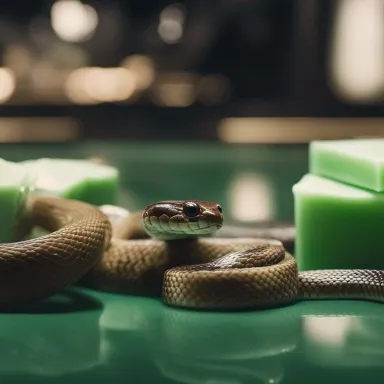So you’re wondering if Irish Spring soap is the miracle solution to keeping those slithering reptiles away from your garden or backyard, huh?
Well, you’re not alone. People have been talking about this idea for ages, but it’s time to separate fact from folklore.
In this article, we’ll explore the myth surrounding Irish Spring soap and its supposed ability to repel snakes. Can a bar of soap really be the ultimate snake deterrent, or is it just an old wives’ tale? Let’s find out.

Overview
Snakes are fascinating creatures that can be found in various parts of the world. Whether you’re an avid hiker, a gardener, or simply someone concerned about keeping snakes at bay, understanding snake behavior and effective repellent options is crucial.
One popular claim that has garnered attention is the potential of Irish Spring soap to repel snakes. In this article, we will delve into the background information, types of snakes, snake behavior, and snake repellents.
We will then explore the composition and properties of Irish Spring soap, examine the claims made about its snake-repelling capabilities, evaluate the evidence supporting these claims, and discuss alternative snake repellent options.
Finally, we will explore how to use Irish Spring soap effectively as a snake repellent, highlight precautions and recommendations, and conclude with a summary of findings.
Background Information
Snakes have been a subject of fascination, fear, and reverence throughout human history. Found in various habitats worldwide, snakes come in a wide range of sizes, colors, and behaviors. While majority of snakes are harmless to humans, there are venomous species that can pose a threat. Understanding snake behavior and effective methods of preventing unwelcome encounters is essential.
Purpose of the Article
The purpose of this article is to explore the popular claim that Irish Spring soap can repel snakes. We will investigate its ingredients, fragrances, and potential repellent properties. By examining anecdotal evidence and scientific research, we will evaluate the validity of this claim. Additionally, we will explore alternative snake repellent options, such as chemical and natural repellents, as well as preventive measures. Lastly, we will provide detailed instructions on how to use Irish Spring soap effectively as a snake repellent, while highlighting safety concerns, environmental impact, and the importance of consulting experts in snake-related matters.
Understanding Snakes
Types of Snakes
There are thousands of snake species worldwide, each with its own unique characteristics and habitat preferences. Snakes can be broadly categorized into venomous and non-venomous species. Venomous snakes, such as rattlesnakes, cobras, and vipers, possess venom that they use for hunting prey or self-defense. Non-venomous snakes, like garter snakes, king snakes, and pythons, rely on constriction or chasing down their prey to survive. It’s important to note that not all venomous snakes are aggressive, and most snake species prefer to avoid confrontation with humans.
Snake Behavior
Understanding snake behavior is crucial in mitigating potential encounters. Snakes are ectothermic, meaning they regulate their body temperature through their environment. They can be found in a variety of habitats, including forests, grasslands, deserts, and even urban areas. Snakes are usually more active during warmer months, where they hunt for food and mate. They can be attracted to areas with a suitable food source, such as rodents, and ample hiding spots, like shrubs or rock piles. Snakes are highly sensitive to vibrations and can detect potential threats through their forked tongues, which pick up scent particles in the air.
Snake Repellents
Snake repellents are substances or devices designed to deter snakes from entering specific areas. These repellents work by emitting odors or vibrations that snakes find unpleasant or threatening. There are a variety of snake repellents available on the market, ranging from chemical sprays to natural remedies. Some common active ingredients found in snake repellents include naphthalene, sulfur, cinnamon oil, and clove oil. It is important to note that the effectiveness of snake repellents can vary, and no repellent offers a foolproof solution.
Irish Spring Soap: Composition and Properties
Ingredients of Irish Spring Soap
Irish Spring soap, known for its distinct fragrance, is a popular bath soap brand. Its composition can vary slightly depending on the specific variant, but the core ingredients typically include sodium tallowate or sodium palmate (soap), water, glycerin, fragrance, and sodium chloride. Additional ingredients may include coconut acid, cornstarch, palm kernel acid, and titanium dioxide. The specific combination of these ingredients gives Irish Spring soap its unique properties.
Fragrances
One of the distinct features of Irish Spring soap is its refreshing scent. The fragrance of Irish Spring soap is commonly associated with a blend of floral, herbal, and citrus notes. The specific fragrances used in Irish Spring soap can vary between different variants, but they are designed to provide a long-lasting and invigorating scent after use. It is this fragrance that supposedly acts as a deterrent to snakes, hence the claim that Irish Spring soap can repel them.
Claims and Uses
Irish Spring soap is primarily marketed as a bath soap for personal hygiene. It is known for its ability to effectively cleanse the skin and leave a lasting fragrance. However, in recent years, anecdotal claims have emerged suggesting that Irish Spring soap can repel snakes. The idea behind this claim is that the strong fragrance of the soap is unpleasant to snakes and can deter them from entering treated areas. Some individuals have reported success in using Irish Spring soap to keep snakes away from their properties, gardens, or camping sites.
Claims about Irish Spring Soap Repelling Snakes
Origins of the Claim
The claim that Irish Spring soap can repel snakes seems to have originated from anecdotal reports among individuals who have used it in snake-prone areas. These claims have circulated through word-of-mouth, online forums, and social media platforms. While such personal accounts serve as a source of initial information, it is important to critically evaluate these claims and assess the scientific evidence supporting them.
Anecdotal Evidence
Anecdotal evidence refers to individual accounts and personal experiences that support a particular claim. In the case of Irish Spring soap repelling snakes, numerous people have reported success in using it as a snake deterrent. These individuals claim that placing bars of Irish Spring soap around their homes, gardens, or campsites has effectively kept snakes at bay. Some proponents of this method believe that the specific fragrance of Irish Spring soap is particularly repulsive to snakes, leading them to avoid treated areas.
Scientific Research
In order to determine the validity of the claim that Irish Spring soap repels snakes, it is important to examine any scientific research conducted on the subject. At present, there is a lack of peer-reviewed studies specifically investigating the snake-repellent properties of Irish Spring soap. The absence of scientific consensus on this topic highlights the need for further research to provide more conclusive evidence.
Evaluating the Claim
Effectiveness of Irish Spring Soap against Snakes
Without clear scientific research, it is challenging to definitively determine the effectiveness of Irish Spring soap as a snake repellent. Anecdotal evidence, while intriguing, should be interpreted with caution as it does not hold the same weight as empirically gathered data. However, it is worth considering that certain fragrances may have the potential to deter snakes due to their sensitive olfactory systems. Although Irish Spring soap has not been proven to be a foolproof snake repellent, it may serve as a deterrent in some cases.
Limitations of the Research
The lack of scientific research exploring the snake-repellent properties of Irish Spring soap presents limitations when evaluating the claim. Controlled studies are necessary to assess the specific impact of Irish Spring soap on different snake species. Factors such as scent preferences, environmental conditions, and species-specific behaviors need to be taken into account. Additionally, the concentration of soap, application methods, and other variables need to be standardized for accurate comparison.
Alternative Explanations
While anecdotal evidence supports the claim that Irish Spring soap repels snakes, it is important to consider alternative explanations for these reported results. Snakes may be avoiding areas treated with Irish Spring soap due to factors other than the soap itself. For example, the act of placing bars of soap may change the environment, making it less hospitable to snakes. Additionally, the scent of soap may mask other attractive scents, such as the scent of potential prey, leading snakes to seek alternative areas. These alternative explanations highlight the need for further research to better understand the mechanisms behind any observed snake repellent effects.
Other Snake Repellent Options
Chemical Repellents
Apart from Irish Spring soap, various chemical snake repellents are available in the market. These products typically contain active ingredients such as naphthalene, sulfur, or ammonium compounds. Chemical repellents are designed to emit odors that snakes find unpleasant or threatening. They are often available as sprays or granules and can be applied to specific areas or perimeter barriers. It is important to read and follow the instructions provided by the manufacturer when using chemical snake repellents.
Natural Repellents
For those seeking natural alternatives, there are several plant-based substances that are believed to repel snakes. Some popular natural snake repellents include cinnamon oil, clove oil, cedar oil, and garlic. These substances are known for their strong scents, which are said to deter snakes. Natural repellents may be considered a more environmentally friendly option compared to chemical options, but their effectiveness can vary depending on factors such as concentration, application method, and snake species.
Preventive Measures
In addition to using snake repellents, implementing preventive measures can help minimize encounters with snakes. Clearing clutter and debris in outdoor areas can reduce potential hiding spots for snakes. Maintaining a well-trimmed lawn and removing excess vegetation can also make an area less attractive to snakes. Repairing gaps or cracks in walls, doors, or windows can prevent snakes from entering buildings. Educating oneself about local snake species, their habitats, and behaviors can also aid in avoiding unnecessary encounters.
Using Irish Spring Soap as a Snake Repellent
Methodological Approaches
When using Irish Spring soap as a potential snake repellent, it is important to adopt a methodical approach to maximize its effectiveness. Placing bars of Irish Spring soap strategically around the desired area can create a barrier or scent deterrent. It is recommended to place soap bars along potential entry points, gaps, or areas where snakes are more likely to hide. It is essential to regularly inspect and replace the soap bars, as the fragrance may fade over time.
Application Techniques
To create a snake-repellent barrier, bars of Irish Spring soap can be placed in areas such as garden borders, around the perimeter of structures, or near entrances to homes or sheds. Some individuals choose to hang mesh bags filled with grated Irish Spring soap to enhance the release of fragrance. Care should be taken not to directly contact plants or water sources with the soap, as it may have unintended consequences. Following the manufacturer’s instructions on the specific variant of Irish Spring soap is important for the best results.
Effectiveness and Longevity
The effectiveness of using Irish Spring soap as a snake repellent may vary depending on factors such as snake species, environmental conditions, and the presence of other attractants. It is essential to note that no repellent offers guaranteed protection against snakes. Additionally, the longevity of Irish Spring soap’s scent may diminish over time, requiring periodic replacement or reapplication. Regular monitoring of the treated areas and making necessary adjustments will help maintain the repellent effect.
Precautions and Recommendations
Safety Concerns
While Irish Spring soap is generally considered safe for human use, it is important to exercise caution when using it as a snake repellent. Avoid direct contact with the eyes, and in case of any adverse reactions, discontinue use immediately. It is advisable to wear gloves when handling soap bars to minimize potential skin irritations. Keep soap bars out of the reach of children and pets to prevent accidental ingestion.
Environmental Impact
The use of Irish Spring soap or any other snake repellent should be done with consideration for the environment. Avoid placing soap bars near water sources, as the release of soap into these areas may be harmful to aquatic life. Additionally, if soap bars break down, it is important to dispose of them properly to prevent any negative impact on the environment.
Consulting Experts
For individuals who are uncertain about the presence of snakes in their area or need guidance on effective snake deterrent methods, consulting with local wildlife or pest control experts is recommended. These professionals can provide specific advice on identifying snake species, evaluating potential risks, and implementing appropriate preventive measures. Their expertise can help ensure the safety and well-being of both humans and snakes.
Conclusion
In conclusion, while some anecdotal evidence suggests Irish Spring soap may deter snakes, there is no definitive scientific proof.
It is theorized that certain fragrances might repel snakes due to their sensitive sensory systems, but more research is needed for conclusive results.
There are various snake repellent options available, each with its own pros and cons, which should be considered based on personal preferences and circumstances.
If using Irish Spring soap as a snake deterrent, a methodical approach, regular monitoring, and expert consultation are advised to optimize effectiveness and minimize environmental impact.
Ultimately, understanding snake behavior, practicing preventive measures, and maintaining respectful coexistence with snakes is essential for harmonious living.



